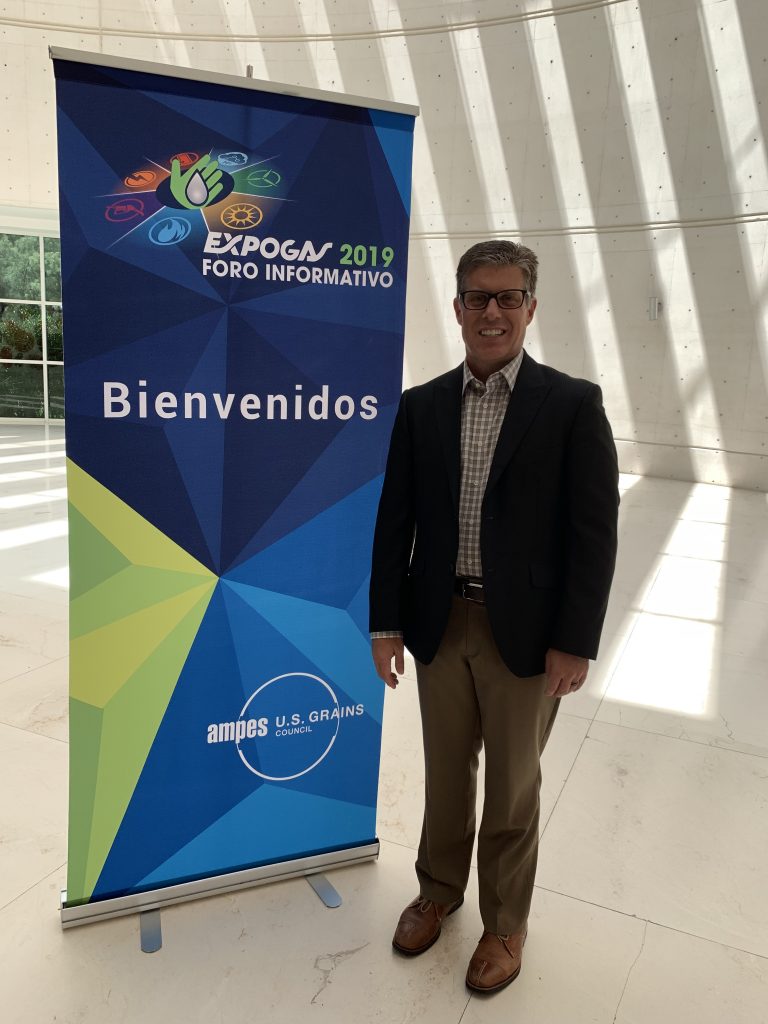As 2019 draws to a close, so does the second successful year of a workshop series the U.S. Grains Council (USGC) has conducted with the Mexican Retailer Service Station Association (AMPES) to promote increased use of ethanol.
“More than 300 participants, representing 1,000 gasoline stations in Mexico, heard about the benefits of ethanol and how to implement it in their stations,” said Stephan Wittig, USGC director for Mexico. “The whole fuel industry was represented during these workshops, emphasizing the success of a policy that has led to a cleaner environment, lower gasoline prices and a diversified gasoline supply.”
Outside of three cities – Mexico City, Guadalajara and Monterrey, Mexican service stations are now able to use E10, following a change in Mexican law in 2017. The current regulation (NOM-016) represents a potential ethanol market of 720 million gallons, the equivalent of 6.41 million metric tons of corn (252.6 million bushels).
To help capture this demand, the Council built up its relationship with AMPES established during the push to open the Mexican market to ethanol. Together, both groups organized and sponsored 11 workshops in different cities throughout Mexico in 2019 for the most important regional gasoline markets to answer questions on the practical use of ethanol and address how to properly use it as a fuel oxygenate.
“Despite the allowance for E10 blending outside of the three cities, ethanol is still a new product in Mexico,” Witting said. “Workshops like these help increase knowledge of the benefits and usage of ethanol and provide technical experts to answer questions about the U.S. transition to E10, the costs associated with adapting stations to use ethanol, as well as general pricing and supplier questions.”
Station owners are particularly interested in how they can use ethanol to save on costs and differentiate themselves from competitors. The Council partnered with the American Coalition for Ethanol (ACE), Growth Energy and the Renewable Fuels Association (RFA) to provide expert speakers to address these topics.
“These workshops are the ideal way for the Council to be touch with Mexican gasoline retailers,” Wittig said. “Attendance of between 30 and 60 gasoline retail station owners each time connects us with independent retailers, importers and distributors all over the country, allows us to clear many of the myths about ethanol use, spurs interest in blending ethanol and convinces distribution companies to start asking for quotes on ethanol and how to incorporate ethanol tanks in their current and planned facilities.”
As a result of these workshops, the Council has had one-on-one discussions with individual retailers about ethanol importation. In particular, one major service station company that attended a similar seminar in 2018 is now importing E10 gasoline from the United States and taking advantage of its economic benefits. Overall, Mexican purchases of U.S. ethanol increased by nearly 19 percent over the prior year to 33.7 million gallons (13.4 million bushels in corn equivalent) in 2018/2019, valued at $55.3 million.
As 2020 begins, the Council will continue to help educate retailers, station equipment installers and local station owners who want to sell more ethanol-blended gasoline as Mexico’s transportation fuel sector continues to evolve.
“2020 looks bright, stepping up the strategy with ethanol suppliers at the workshop – closing the gap between market development and physical gallons,” Wittig said. “The interest and questions have only become more technical and detailed and we want to be able to answer those questions with offers from our suppliers.”
Learn more about the Council’s work to promote ethanol in Mexico.
About The U.S. Grains Council
The U.S. Grains Council develops export markets for U.S. barley, corn, sorghum and related products including distiller’s dried grains with solubles (DDGS) and ethanol. With full-time presence in 28 locations, the Council operates programs in more than 50 countries and the European Union. The Council believes exports are vital to global economic development and to U.S. agriculture’s profitability. Detailed information about the Council and its programs is online at www.grains.org.


